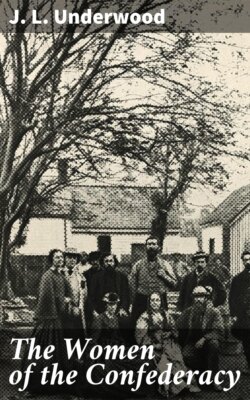Читать книгу The Women of the Confederacy - J. L. Underwood - Страница 20
На сайте Литреса книга снята с продажи.
GEN. BRADLEY T. JOHNSON’S SPEECH AT THE DEDICATION OF SOUTH’S MUSEUM
ОглавлениеTable of Contents
What Our Women Stood
[In Southern Historical Papers, Volume 23, pages 368-370.]
Evil dies, good lives; and the time will come when all the world will realize that the failure of the Confederacy was a great misfortune to humanity, and will be the source of unnumbered woes to liberty. Washington 29 might have failed; Kosciusko and Robert E. Lee did fail; but I believe history will award a higher place to them, unsuccessful, than to Suwarrow and to Grant, victorious. This great and noble cause, the principles of which I have attempted to formulate for you, was defended with a genius and a chivalry of men and women never equalled by any race. My heart melts now at the memory of those days.
Just realize it: There is not a hearth and home in Virginia that has not heard the sound of hostile cannon; there is not a family which has not buried kin slain in battle. Of all the examples of that heroic time; of all figures that will live in the music of the poet or the pictures of the painter, the one that stands in the foreground, the one that will be glorified with the halo of the heroine, is the woman—mother, sister, lover—who gave her life and heart to the cause. And the woman and girl, remote from cities and towns, back in the woods, away from railways or telegraph.
Thomas Nelson Page has given us a picture of her in his story of “Darby.” I thank him for “Darby Stanly.” I knew the boy and loved him well, for I have seen him and his cousins on the march, in camp, and on the battlefield, lying in ranks, stark, with his face to the foe and his musket grasped in his cold hands. I can recall what talk there was at a “meetin’” about the “Black Republicans” coming down here to interfere with us, and how we “warn’t goin’ to ’low it,” and how the boys would square their shoulders to see if the girls were looking at ’em, and how the girls would preen their new muslins and calicoes, and see if the boys were “noticen’,” and how by Tuesday news came that Captain Thornton was forming his company at the court-house, and how the mother packed up his little “duds” in her boy’s school satchel and tied it on his back, and kissed him and bade him good-bye, and watched him, as well as she could see, as he went down the walk to the front gate, and as he turned into the “big road,” and as he got to the corner, turned round and took off his hat and swung it around his head, and then disappeared out of her life forever. For, after 30 Cold Harbor, his body could never be found nor his grave identified, though a dozen saw him die. And then, for days and for weeks and for months, alone, the mother lived this lonely life, waiting for news. The war had taken her only son, and she was a widow; but from that day to this, no human being has ever heard a word of repining from her lips. Those who suffer most complain least.
Or, I recall that story of Bishop-General Polk, about the woman in the mountains of Tennessee, with six sons. Five of them were in the army, and when it was announced to her that her eldest born had been killed in battle, the mother simply said: “The Lord’s will be done. Eddie (her baby) will be fourteen next spring, and he can take Billy’s place.”
The hero of this great epoch is the son I have described, as his mother and sister will be the heroines. For years, day and night, winter and summer, without pay, with no hope of promotion nor of winning a name or making a mark, the Confederate boy-soldier trod the straight and thorny path of duty. Half-clothed, whole-starved, he tramps, night after night, his solitary post on picket. No one can see him. Five minutes’ walk down the road will put him beyond recall, and twenty minutes further and he will be in the Yankee lines, where pay, food, clothes, quiet, and safety all await him. Think of the tens of thousands of boys subjected to this temptation, and how few yielded! Think of how many dreamed of such relief from danger and hardship! But, while I glorify the chivalry, the fortitude, and the fidelity of the private soldier, I do not intend to minimize the valor, the endurance, or the gallantry of those who led him.
